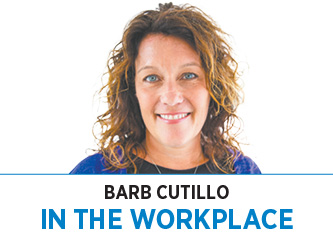Subscriber Benefit
As a subscriber you can listen to articles at work, in the car, or while you work out. Subscribe Now Many of you know of the hero’s journey: the protagonist who goes on an adventure, learns a lesson, wins a victory and returns home transformed. It is a timeless storytelling pattern that crosses cultures and genres, with “The Odyssey,” “Star Wars” and “The Lord of the Rings” trilogy just a few examples. Believe it or not, the hero’s journey is also an effective road map for obtaining that promotion or new job assignment at work.
Many of you know of the hero’s journey: the protagonist who goes on an adventure, learns a lesson, wins a victory and returns home transformed. It is a timeless storytelling pattern that crosses cultures and genres, with “The Odyssey,” “Star Wars” and “The Lord of the Rings” trilogy just a few examples. Believe it or not, the hero’s journey is also an effective road map for obtaining that promotion or new job assignment at work.
The hero’s journey refers to universal themes of human experience, such as self-discovery, transformation and growth. Initially, the hero is called to an adventure, and at first glance, rejects the call, often due to fear or self-doubt. Next, they encounter a mentor who provides guidance and support, confront many tests and trials, and finally, must face their greatest fears and challenges. Once they overcome their greatest obstacle, they receive a reward and are transformed, returning home a hero.
These stages mirror the steps required to build self-awareness, a key component of emotional intelligence, which is essential for success in the workplace. By becoming more self-aware, i.e. embarking on the hero’s journey, you can enhance your personal and professional growth, achieve your goals and get that promotion.
Self-awareness is the ability to understand your own emotions, personality, strengths and weaknesses, and how they affect you and others. Self-awareness is important in business because it can help you improve your performance and opportunities for advancement, make better decisions and communicate more effectively. Many people believe they are self-aware, but research shows that only 10%-15% of the people studied demonstrated a high level of self-awareness. What does it mean to be self-aware? How does it help your career and personal life?
We will start with a definition. Researchers identified two main self-awareness categories: internal and external. Internal self-awareness is how clearly you see yourself and your reactions in an environment; external self-awareness is how we believe others see us and our behavior in the environment.
Neither one is better than the other. Effective leaders work to balance them, seeing “themselves clearly and open to receiving feedback to understand how others see them.” The hero’s journey is also one of self-discovery—seeing yourself clearly and understanding your strengths and weaknesses before you embark on the journey is a critical step.
Another aspect of self-awareness that aligns with the hero’s journey is related to the quality of feedback and the way it is delivered. Research shows that, as leaders gain more experience and power, their self-awareness often decreases. This might seem counterintuitive at first, but leaders with more experience seek less feedback, and powerful leaders often surround themselves with “yes” people.
Just as the hero needs a mentor to kick-start the journey and provide support and guidance, leaders need to connect with “loving critics”—people who care enough to provide honest feedback. The loving critic and hero’s mentor will be a supportive sounding board as you work toward your goals.
Finally, to improve our self-awareness, we need to ask “what” instead of “why.” Self-reflection is critical throughout this process but needs a future focus rather than a backward-looking approach. So instead of asking why something negative is always happening, ask what is causing this to happen, and what can be done about it.
In the hero’s journey, this step mimics when the hero is under tremendous pressure and is facing the biggest obstacle. To overcome the challenge, the hero often must take a hard look within themselves to find the answer, requiring asking tough questions to gain insight and knowledge.
Like “Star Wars” hero Luke Skywalker, we can ask for feedback from others and be open to their perspectives. Like Frodo Baggins in “The Lord of the Rings,” we can reflect on our own experiences and actions and learn from our mistakes. Thus, self-awareness is a critical aspect of the hero’s journey and, in fact, a superpower since not many people truly possess it. Those that do are often celebrated leaders and fantastic bosses.
The villains in our hero’s journey are not difficult to spot in the workplace. They are unable to recognize how their actions and behaviors affect themselves and others, often lacking empathy, communication and feedback skills. They might also have cognitive biases that distort their perception of reality and prevent them from learning from their mistakes. We’ve all worked with others who continue to make the same mistakes and never learn from them, or leaders who do not “read the room” and make disparaging statements.
Consider the possibility of promotion or the desirable job assignment the “call to adventure” and embark on the hero’s journey to obtain it. Grow your self-awareness by seeking feedback, embracing outside viewpoints and finding a loving mentor, like Yoda, to help along the way.
Then, when you face your biggest challenge, ask yourself the tough internal questions to conquer the fear and generate options for success. Much like Luke destroying the Death Star, you will be rewarded with newly gained insight and confidence that will ultimately lead to greater success in your career.•
__________
Barb Cutillo is a lecturer of management at the Indiana University Kelley School of Business Indianapolis.
Please enable JavaScript to view this content.
